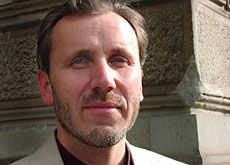Swiss-American voters worried by Iraq

Around 120 million Americans are expected to cast a ballot in Tuesday's midterm congressional elections, including many voters of Swiss origin.
But unlike the Jewish, Afro-American or Muslim communities, the Swiss will not vote as a bloc in favour of the Democratic or the Republican parties.
Erdmann Schmocker, a historian, says that the Swiss community is so old, diverse and widespread that it is difficult to say whether its members are aligned with one of the two mainstream parties.
“Most Swiss immigrants arrived at the beginning of the 19th century,” he told swissinfo. “At first, many of them came from the nobility, and then later it was a lot of farmers.”
Unlike most minorities, Swiss-Americans do not have an issue that unifies them, unlike Afro-Americans with their fight for civil rights, or the Jewish and Muslim communities with the conflict in the Middle East.
The Swiss therefore do not vote as a bloc. “This group reflects the trends and concerns of most Americans,” said Schmocker, who used to preside over the Swiss-American Historical Society.
Iraq
Today the biggest issue in US politics is the war in Iraq. Polls have shown that voters are more worried about the conflict than about the economy, terrorism or immigration.
Swiss-Americans contacted by swissinfo are no different, citing Iraq as the number-one issue, ahead of illegal immigration, the failing health system and security.
“The situation is not good in Iraq,” said Max Gonzenbach, owner of a cheese factory in Milbank, South Dakota. Gonzenbach, whose father emigrated to the US in 1924, usually votes for Republican candidates.
He reckons George Bush made the right decision to send troops to Iraq based on the intelligence data he had at the time, but he is now hoping that US forces will be able to withdraw gradually.
Inflexible
In North Carolina, Hans Moser, chairman of the South Davidson Republican Party precinct, also supports the president.
But Moser, who emigrated in 1990 after marrying an American, says that Bush has shown himself to be too “inflexible” over the war and that the head of the Pentagon, Donald Rumsfeld, should go.
“George Bush and his wife are people with high moral standards, but we would like the president to correct his mistakes and start planning to get our troops out of Iraq without a deadline,” he told swissinfo.
On the other side of the country, Léa Hoffmann, who supports the Democrats, wants an immediate withdrawal from the Middle East.
“We started this war,” she said. “I hate to have to say ‘we’ and I don’t enjoy being ashamed of my country.”
Protest vote
This teacher who lives in Helvetia, an Oregon town founded in 1850 by Swiss immigrants, will vote Democrat as usual. She readily admits the Democratic Party doesn’t have a clear plan for Iraq, but she claims her vote is essentially one against the president.
“Politicians, including Democrats, are afraid to say what they really think about Iraq because they’re worried they’ll lost their seat,” said Hoffmann, whose great-grandparents were Swiss.
“George Bush is an incompetent, out-of-touch buffoon, surrounded by untrustworthy people,” she added.
Erwin Zweifel, whose grandfather emigrated in 1870, is less categorical. A retiree living in New Glarus, Wisconsin, where he sings in the local yodelling group, he is registered as an independent who votes Republican or Democrat depending on the ballot.
While refusing to reveal his preference for this election, this Korean War veteran does admit that his biggest concern is Iraq, along with the new Medicare drug prescription programme accepted by Congress for over-65s.
“We are in so deep in Iraq that I don’t know if we can get out and I’m worried that the situation could get worse than the Vietnam War,” warned Zweifel.
swissinfo, Marie-Christine Bonzom in Washington
There are 1.2 million Americans of Swiss descent.
5,000 US towns and cities have Swiss names.
The states with the highest density of residents with Swiss roots are California, New York, Ohio, Pennsylvania and Wisconsin.
On the first Tuesday after the first Monday in November of every even-numbered year, elections are held for all 435 members of the United States House of Representatives and a third of the 100 members of the Senate.
Besides members of Congress, state legislatures, and some state governors are chosen, but not the President.
34 of the 50 US states elect their governors to four-year terms during midterm elections, while Vermont and New Hampshire elect governors to two-year terms in midterm and presidential elections.

In compliance with the JTI standards
More: SWI swissinfo.ch certified by the Journalism Trust Initiative










You can find an overview of ongoing debates with our journalists here . Please join us!
If you want to start a conversation about a topic raised in this article or want to report factual errors, email us at english@swissinfo.ch.